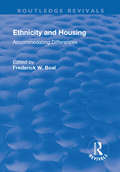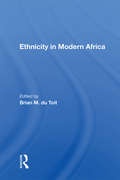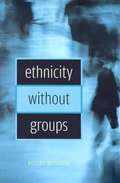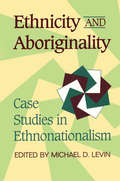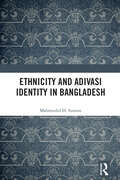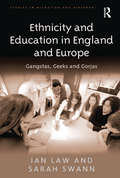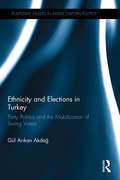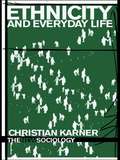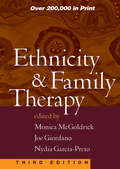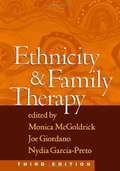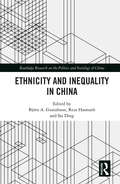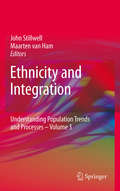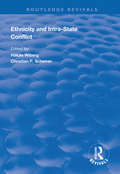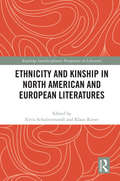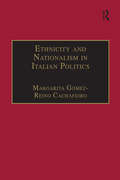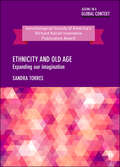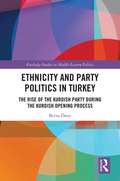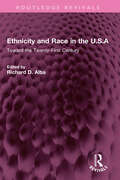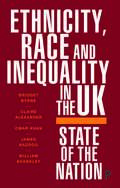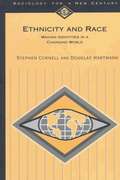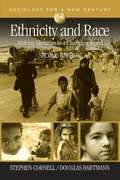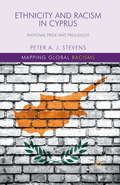- Table View
- List View
Ethnicity Housing: Accommodating the Differences (Routledge Revivals)
by Frederick W BoalThis title was first published in 2000: This work has its origins in the 1995 Congress of the International Federation for Housing and Planning, held in Belfast. The theme was "Accommodating Differences". "Differences" were defined in broad terms, and included ethnic and social, economic and political differences. However, Frederick W. Boal's own interest in ethnic differences motivated him to invite a number of Congress participants to make available their papers for inclusion in this book of essays. It seeks to offer experience that can be drawn on by housing practitioners who are operating in multi-ethnic contexts. It also provides empirical material that should contribute to the development of more soundly-based theoretical insights in both urban sociology and social geography.
Ethnicity In Modern Africa
by Brian M. du ToitThe fifteen essays written for this volume reflect the increasing importance for social scientists of ethnic, rather than physical or tribal, criteria for classifying modern population groups. The authors—from South Africa, the United States, South West Africa (Namibia), Nigeria, and Scotland—cover most of Africa south of the Sahara. They consider the range from large national population groupings to small-scale societies attempting to maintain their social boundaries, and discuss such topics as emergent nationalism, ethnic divisiveness, social distance, voluntary association, and the role of women. The first section is concerned with particular communities, peoples, and ethnic groups, and treats traditional tribal groupings as well as communities delineated on phenotypic grounds. In the second section, the focus turns to modern situations of interaction; the two major themes discussed here are situational ethnicity and situational realignment. The third section deals with color, one of the physical criteria of ethnic identification; here the authors discuss the political and legal implications of a system based on color. The last essay reports on current changes in attitude and organization within the countries of white-ruled southern Africa.
Ethnicity Without Groups
by Rogers BrubakerThat ethnicity is constructed is commonplace; this volume provides new insights into how it is constructed. By shifting the analytical focus from identity to identifications, from groups as entities to group-making projects, from shared culture to categorization, from substance to process, Brubaker shows that ethnicity, race, and nation are not things in the world but perspectives on the world: ways of seeing, interpreting, and representing the social world.
Ethnicity and Aboriginality
by Michael LevinEthnonationalism is a phenomenon of great importance in many parts of the world today. In this collection of papers, nine distinguished anthropologists focus on Canadian and international case studies to show how ethnonational claims of cultural groups have been expressed and developed in specific historical and political situations, from observations of Quebec to the former Soviet Union, through problems of the Australian aborigines, Malay identity, the Avaglogoli in Western Kenya, and ethnic cultures in Nigeria, the essays reflect the complexity of the claims and aspirations of different groups. Some deal with intractable demand for sovereignty, others with solutions that attempt to achieve a level of autonomy and recognition short of sovereignty.The intellectual history of the right of self-determination is little more than 200 years old. It is only since that time that the ideal of popular sovereignty by any group that views itself as a people became an accepted view. These writers have used a paper by Walker Connor, 'The Politics of Ethnonationalism' as a foil against which to develop their own theses. Connor argues that claims to self-determination based on ethnic identity present problems to all but a few states, and since these claims are unlikely to be satisfied, ethnonationalism is disruptive of political order. The papers in this volume do not accept his negative conclusions, although they share a sense of secession and division are less worthy outcomes than pluralist structures. Nevertheless, in Valery Tishkov's discussion of the former Soviet Union, secession appears to be the only solution. Since ethnonationalism will continue to be a political issue for some time, these papers form a significant base for future political debate.
Ethnicity and Adivasi Identity in Bangladesh
by Mahmudul H. SumonThis book explores the transitions in the adivasi identity as well as in the political representation of adivasi communities in Bangladesh. It traces the use of categories such as “primitive”, “tribe”, and “adivasi” in post-colonial Bangladesh, both in the political discourse and in everyday life. The volume studies the history of these essentialized categories used for indigenous communities within the hierarchies of power and identity. It also analyses the diverse articulations of indigeneity through ethnographic narratives, exploring the formations of newer traditions and identity. The author highlights the persistence of the terms “simple” and “primitive” in contemporary discourses while also sharing examples of complex mediations and appropriation of these categories by adivasi groups in Bangladesh. This book will be of interest to researchers and students of sociology, social ethnography, social and cultural anthropology, indigenous studies, exclusion studies, development studies, political sociology, and South Asian studies.
Ethnicity and Education in England and Europe: Gangstas, Geeks and Gorjas (Studies in Migration and Diaspora)
by Ian Law Sarah SwannEthnicity and Education in England and Europe examines where, when and how minority ethnic groups miss out on educational opportunities. Through a combination of comparative, quantitative and qualitative methodologies and the showcasing of new research, it provides a fresh approach to examining the long-standing debates over ethnicity, and in particular ethnic differences in educational achievement. Drawing on extensive empirical research in England, as well as information gathered as part of a major international programme of research under the auspices of the European Union (EDUMIGROM), this book both synthesises the findings of the English team and puts these findings in context through comparison with the analytical material generated in a range of other European countries. With a key focus on the educational experiences and outcomes of the Roma in Central and Eastern Europe, as compared with the experiences of minority ethnic groups in Western Europe, this volume provides a contemporary assessment of ethnic relations across a selected range of European countries. Presenting comparative, cross-national analyses of ethnic inequalities and policy interventions, Ethnicity and Education in England and Europe makes a significant contribution to debates in the fields of migration, ethnicity and education, and will be of interest to both scholars and policy makers concerned with questions of race and educational outcome.
Ethnicity and Elections in Turkey: Party Politics and the Mobilization of Swing Voters (Routledge Studies in Middle Eastern Politics)
by Gul AkdagEthnicity and Elections in Turkey attempts to understand the mobilization strategies of incumbent parties to consolidate and increase their support among swing voters of an ethnic group. By analyzing the strategy of AKP on voters of Kurdish origin, it investigates the conditions under which it can mobilize them through the clientelistic network and its effectiveness in increasing support for the party. This investigation is conducted through a district and neighborhood level case study conducted in the districts of Beyoğlu, Sancaktepe and Beykoz situated in Istanbul. The main hypotheses are tested through five different steps. Firstly, an examination of electoral results identifies a large number of voters of Kurdish origin as ideologically close to pro-Islamist and pro-Kurdish parties. Secondly, the book identifies the main organs responsible of mobilizing voters and defines the nature of the clientelistic network. Thirdly, the study suggests that the incorporation of these voters into the party’s clientelistic network is a function of the number and time of entry of activists of Kurdish origin in the party’s ranks and the intensity of their contacts with the voters. Fourthly, it reveals the effectiveness of clientelistic mobilization in consolidating and increasing support among swing voters of Kurdish origin. Lastly, the inner party organization and critical juncture experienced by the party are argued to be influential in its ability to increase its network through the incorporation of new activists. Providing an alternative explanation of AKP’s electoral success in Turkey, this book is essential reading for students and scholars with an interest in Middle East politics, political parties and political science.
Ethnicity and Empire in Kenya
by Myles OsborneThis book is about the creation and development of ethnic identity among the Kamba. Comprising approximately one-eighth of Kenya s population, the British considered the Kamba East Africa s premier "martial race" by the mid-twentieth century: a people with an apparent aptitude for soldiering. The reputation, indeed, was one that Kamba leaders used to leverage financial rewards from the colonial state. However, beneath this simplistic exterior was a maelstrom of argument and debate. Men and women, young and
Ethnicity and Everyday Life (The New Sociology)
by Christian KarnerMixing theories of the everyday with a wide range of case studies, this book explains the 'character' of ethnicity, from being a political tool of exclusion, to a source of meaning and solidarity, and the relationship between culture, power and identity. Combining theories of the everyday with empirical case studies, this book examines: the 'dual character' of ethnicity – as a political tool of exclusion and source of meaning/ solidarity respectively the relationship between culture, power and identity the significance of historical/socio-economic contexts to ethnicity and everyday life. This book addresses many important questions through a critical application of theories of the everyday to a series of case studies that include travellers, the South Asian diaspora, contemporary Austria, and asylum seekers in 'Fortress Europe'. This book provides an accessible and coherent introduction to the sociology of ethnicity and will be essential reading for undergraduate students on cultural studies, race and ethnic studies, and sociology courses.
Ethnicity and Family Therapy
by Monica McGoldrick, Joe Giordano and Nydia Garcia-PretoThis widely used clinical reference and text provides a wealth of knowledge on culturally sensitive practice with families and individuals from over 40 different ethnic groups. Each chapter demonstrates how ethnocultural factors may influence the assumptions of both clients and therapists, the issues people bring to the clinical context, and their resources for coping and problem solving.
Ethnicity and Family Therapy (3rd Edition)
by Monica Mcgoldrick Nydia Garcia-Preto Joe GiordanoThis widely used clinical reference and text provides a wealth of knowledge on culturally sensitive practice with families and individuals from over 40 different ethnic groups. Each chapter demonstrates how ethnocultural factors may influence the assumptions of both clients and therapists, the issues people bring to the clinical context, and their resources for coping and problem solving.
Ethnicity and Gerontological Social Work
by Rose DobrofEthnicity and Gerontological Social Work presents a compassionate and illuminating update on ethnicity in this area of social work. This fine book looks at such topics as the relationship between white aged clients and non-white paraprofessional workers, minority elder maltreatment, the utilization of social services by the Mexican-American Elderly, the neglected Asian-American Elderly, public policies and services in Japan, and more.
Ethnicity and Inequality in China (Routledge Research on the Politics and Sociology of China)
by Reza Hasmath Bjö A. Gustafsson Sai DingThis book analyses the behaviour of ethnic minority groups in China using the first comprehensive national dataset dedicated to capturing the socio-economic profile of ethnic minorities: the China Household Ethnicity Survey (CHES). Managing ethnic diversity in China has become an increasingly important subject, especially against the backdrop of the nation’s rampant economic growth and changing institutional behaviour. The book has an analytical interest in looking at the benefactors of China’s growth from an ethnic group dimension, and notably, how the economic life of the 55 ethnic minority groups compares to the Han majority. It’s one of the first publications to capture the heterogeneity of ethnic minority groups’ socio-economic experience, through intersectional analysis and multi-disciplinary approaches. Contributing factors in explaining ethnic minorities’ experiences in the urban labour market are also considered: from how linguistic capital and migration patterns vary for ethnic minorities, to the effects of pro-rural policies. Underpinning these are questions about the extent to which happiness and discrimination impact the economic life of ethnic minorities. Ethnicity and Inequality in China will prove an invaluable resource for students and scholars of economics, sociology and contemporary Chinese Studies more broadly.
Ethnicity and Integration
by John Stillwell Maarten Van HamThe theme of this volume is ethnicity and the implications for integration of our increasingly ethnically diversified population, with topics covering demographics and migration of ethnic groups, measures of integration or segregation, health and labour market characteristics, ethnicity and crime and ethnic population projections.
Ethnicity and International Law
by Mohammad ShahabuddinEthnicity and International Law presents an historical account of the impact of ethnicity on the making of international law. The development of international law since the nineteenth century is characterised by the inherent tension between the liberal and conservative traditions of dealing with what might be termed the 'problem' of ethnicity. The present-day hesitancy of liberal international law to engage with ethnicity in ethnic conflicts and ethnic minorities has its roots in these conflicting philosophical traditions. In international legal studies, both the relevance of ethnicity, and the traditions of understanding it, lie in this fact.
Ethnicity and Intra-State Conflict: Types, Causes and Peace Strategies (Routledge Revivals)
by Christian P. Scherrer Håkan WibergPublished in 1999, this text examines domestic wars, looking at inter-state relations only in as far as they are directly relevant to understand such wars. The book aims to indicate how intra-state war differs from the inter-state war, and focuses primarily on such domestic armed conflicts that at least have significant ethnonational components. The book assesses how heterogeneous a category "ethnic conflict" is in terms of causes and consequences, and gauges the complex interplay between class, regionalism and ethnicity. It is not limited to description and causal analysis, but also attempts to assess suggestions as to what types of actors may contribute in what ways to avoiding ethnonational mobilization/polarization, avoiding militarization of manifest conflicts, and de-escalating militarized conflicts by looking for tenable generalizations on what types of approaches are fruitful in bringing about de-escalation, ceasefires, political compromises, peaceful division or peaceful integration, reconciliation.
Ethnicity and Kinship in North American and European Literatures (Routledge Interdisciplinary Perspectives on Literature)
by Silvia SchultermandlThis edited collection applies kinship as an analytical concept to better understand the affective economies, discursive practices, and aesthetic dimensions through which cultural narratives of belonging establish a sense of intimacy and affiliation. In North American and European ethnic literatures, kinship has several social functions: negotiating diasporic belonging in and outside of the perimeters of bloodlines and genealogy; positioning queer-feminist interventions to counter ethno-nationalist narratives of belonging; challenging liberal sentimentalist narratives, such as those grafted onto the bodies of transnational adoptees; re-formulating cultural heterogeneity through interracial and interethnic kinship constellations outside either post-racial assumptions about colorblindness or celebrations of racial and ethnic pluralism. In all of these cases, kinship features as a common theme through which contemporary authors attend to challenges of conscribing individuals into inclusive, counter-hegemonic cultural narratives of belonging.
Ethnicity and Nationalism in Italian Politics: Inventing the Padania: Lega Nord and the Northern Question (Research in Migration and Ethnic Relations Series)
by Margarita Gómez-Reino CachafeiroEmploying primary sources and interviews with protagonists of the rebellion of the Italian North, this book explores the invention of the Padanian nation and the construction of identity politics in Northern Italy. It reveals for the first time the connection between the ethnic wave in European party politics in the 1970s and the rise of a new radical right nationalism in the 1990s. The author highlights the way in which the discourse of national minorities was instrumental in the rise of a new political agenda that links territory, identity and cultural rights to create new boundaries of exclusion. In addition to clarifying the connection between the new nationalism and racism by demonstrating how cultural distinctiveness is constructed in contemporary European politics, this unique book also explores the dynamics of new party mobilization and the symbolic resources of nationalist rhetoric. This book presents for the first time data on political participation - both party elites and members - and the real dimension of the party organization.
Ethnicity and Old Age: Expanding our Imagination (Ageing in a Global Context)
by Sandra TorresWinner of the Richard Kalish Innovative Publication Award 2021. Part of the Ageing in a Global Context series, this book proposes a new research agenda for scholarship that focuses on ethnicity, race and old age. It argues that in a time of increased international migration, population ageing and ethno-cultural diversity, scholarly imagination must be expanded as current research frameworks are becoming obsolete. By bringing attention to the way that ethnicity and race have been addressed in research on ageing and old age, with a focus on health inequalities, health and social care, intergenerational relationships and caregiving, the book proposes how research can be developed in an ethnicity astute and diversity informed manner.
Ethnicity and Party Politics in Turkey: The Rise of the Kurdish Party during the Kurdish Opening Process (Routledge Studies in Middle Eastern Politics)
by Berna ÖneyDelving into Turkey’s political playing field, this book examines how an ethnic party increased its vote shares. The case study looks at the rise of the Kurdish party in Turkey’s 2011 national elections in relation to the mainstream political parties' strategies. The research explores the strategy of the dominant Justice and Development Party that garnered the majority in three consecutive elections, introduced a new political issue, and even initiated an opening process. Investigating the reasons behind why such a dominant party would put itself at risk with this bold strategy and why it still lost votes to the ethnic party in the process, the book traces Turkey’s handling of the Kurdish issue. Combining a detailed analysis of election results, speeches, and social survey findings, the volume offers a novel approach and a rare example of the application of process-tracing methodology. Additionally, the study is one of the first to utilize unsupervised model of scaling texts on the ethnic issue dimension. As the first systematic analysis of the Kurdish opening process, the book will be of interest to students and scholars researching in qualitative methodology, text analysis, ethnic and party politics, Turkey, and the Middle East.
Ethnicity and Race in the U.S.A: Toward the Twenty-First Century (Routledge Revivals)
by Richard D. AlbaFirst published in 1988, Ethnicity and Race in the U.S.A is a collection of studies, by leading scholars of ethnicity and race in the U.S.A. Including chapters on Blacks, American Indians, Hispanics, Asian Americans, and white ethnicities, it provides a data-based analysis. Drawing on the first published results from the 1980 census, it gives a unified and comprehensive picture of both the dynamic and the static elements in ethnic and race relations. It reveals the changing face of ethnicity and race in the U.S.A., and in particular outlines the tremendous changes taking places among the white ethnics. Based on a conference on ‘Ethnicity and Race in the Last Quarter of the Twentieth Century’ held at the State University of New York in Albany, the book will appeal to a wide range of scholars interested in American ethnic experience, including sociologists, historians, political scientists, social workers, and students in ethnic studies programmes.
Ethnicity and Race in the UK: State of the Nation
by Claire Alexander Bridget ByrneAvailable Open Access under CC-BY-NC licence. 50 years after the establishment of the Runnymede Trust and the Race Relations Act of 1968 which sought to end discrimination in public life, this accessible book provides commentary by some of the UK’s foremost scholars of race and ethnicity on data relating to a wide range of sectors of society, including employment, health, education, criminal justice, housing and representation in the arts and media. It explores what progress has been made, identifies those areas where inequalities remain stubbornly resistant to change, and asks how our thinking around race and ethnicity has changed in an era of Islamophobia, Brexit and an increasingly diverse population.
Ethnicity and Race: Making Identities in a Changing World
by Douglas Hartmann Stephen E. CornellEthnicity and Race uses extended case studies from all over the world to craft a compelling, even-handed account of the power and persistence of ethnicity and race in the world.
Ethnicity and Race: Making Identities in a Changing World
by Douglas Hartmann Stephen CornellCornell (sociology, U. of Arizona) and Hartmann (sociology, U. of Minnesota, Minneapolis) present an updated edition of their textbook for advanced undergraduate courses on race and ethnicity in the departments of sociology, ethnic studies, global studies, and anthropology. Revised throughout with new illustrative or empirical materials and updated references, the text includes new discussion of assimilation, the invisibility of racial dominance, and paradigms and analytical frames for understanding group relations, and a new case study on race, culture, and belonging in contemporary France. Annotation ©2007 Book News, Inc., Portland, OR (booknews.com)
Ethnicity and Racism in Cyprus: National Pride and Prejudice? (Mapping Global Racisms)
by P. StevensInvestigating the relationship between ethnic pride and prejudice in the divided community of Cyprus, this book focuses on the ethnic stereotypes that Greek and Turkish Cypriot secondary school students develop of each other and other ethnic groups in Cyprus.
